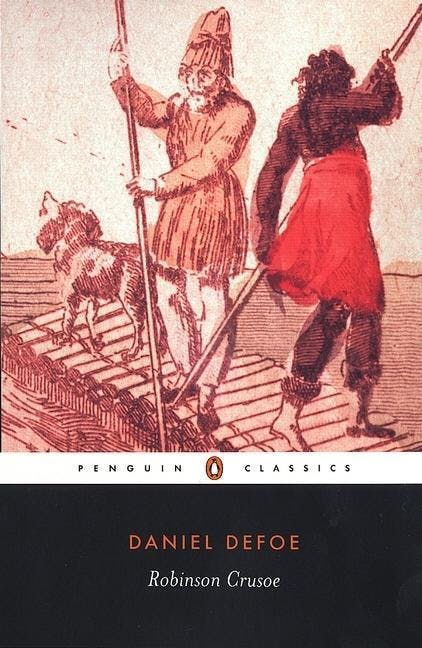Robinson Crusoe Books
Book #1
Robinson Crusoe
Written by Daniel Defoe
18 - 99
Reading
age
286
Page
count
121,526
Word
count
Apr 25, 1719
Publication
date
Paperback
$10.00
$9.30
Summary
The original tale of a castaway struggling to survive on a remote desert island, and one of the first novels in English The sole survivor of a shipwreck, Robinson Crusoe is washed up on a desert island. In his journal he chronicles his daily battle to stay alive, as he conquers isolation, fashions shelter and clothes, enlists the help of a native islander who he names ‘Friday’, and fights off cannibals and mutineers. Written in an age of exploration and enterprise, it has been variously interpreted as an embodiment of British imperialist values, as a portrayal of ‘natural man’, or as a moral fable. But above all is a brilliant narrative, depicting Crusoe’s transformation from terrified survivor to self-sufficient master of an island. This edition contains a full chronology of Defoe’s life and times, explanatory notes, glossary and a critical introduction discussing Robinson Crusoe as a pioneering work of modern psychological realism. For more than seventy years, Penguin has been the leading publisher of classic literature in the English-speaking world. With more than 1,700 titles, Penguin Classics represents a global bookshelf of the best works throughout history and across genres and disciplines. Readers trust the series to provide authoritative texts enhanced by introductions and notes by distinguished scholars and contemporary authors, as well as up-to-date translations by award-winning translators.
The Creative Behind the Book
Author
Daniel Defoe (c. 1660 - 1731) was an English writer, journalist, and spy, who gained enduring fame for his novel, Robinson Crusoe. Defoe is notable for being one of the earliest practitioners of the novel and helped popularize the genre in Britain. In some texts he is even referred to as one of the founders, if not the founder, of the English novel. A prolific and versatile writer, he wrote more than five hundred books, pamphlets, and journals on various topics (including politics, crime, religion, marriage, psychology and the supernatural). He was also a pioneer of economic journalism.






